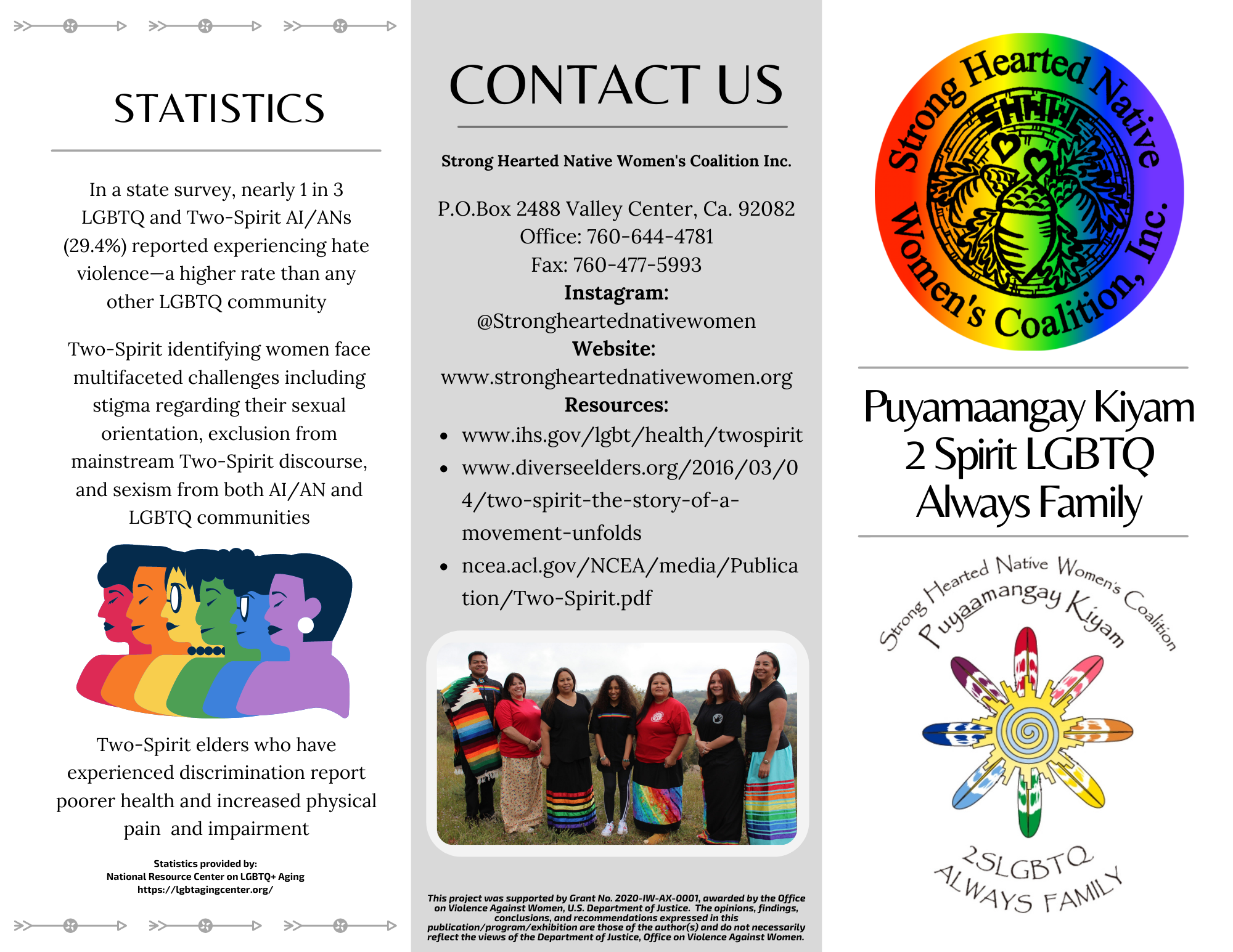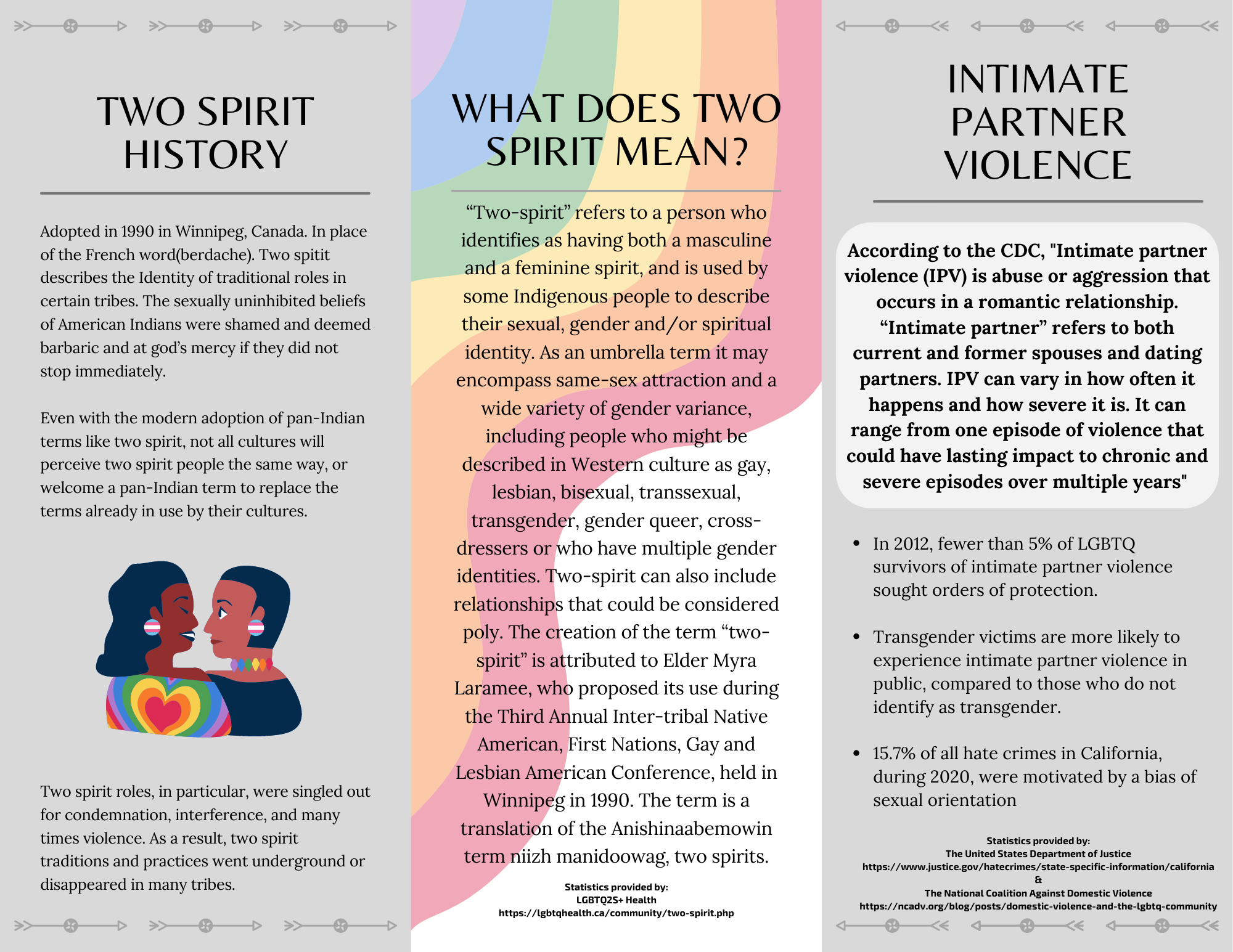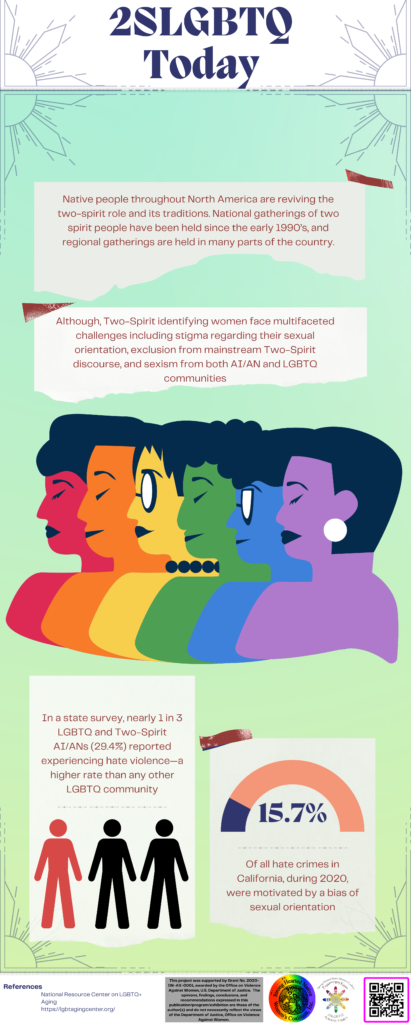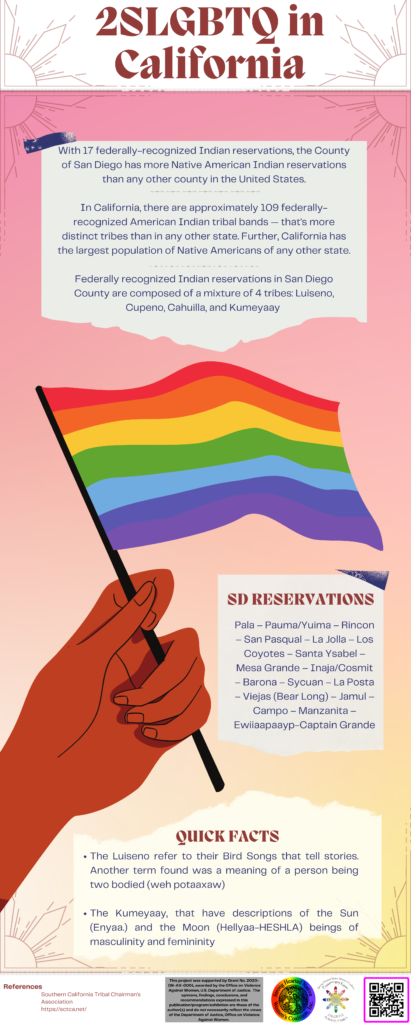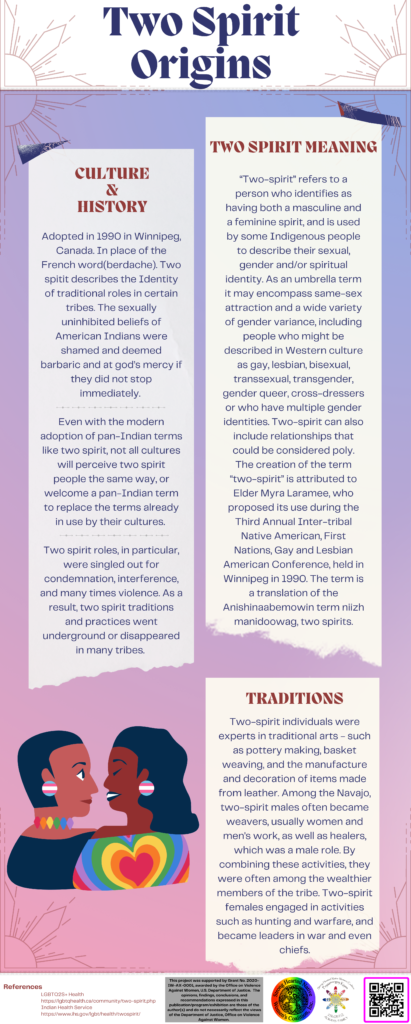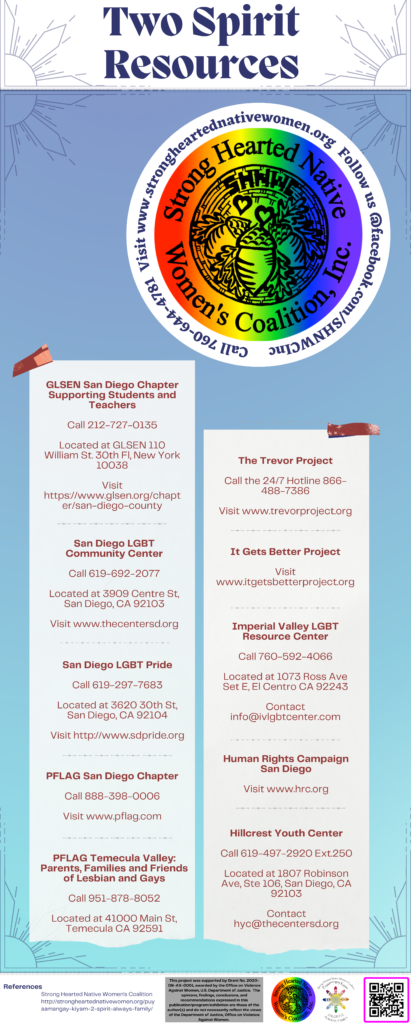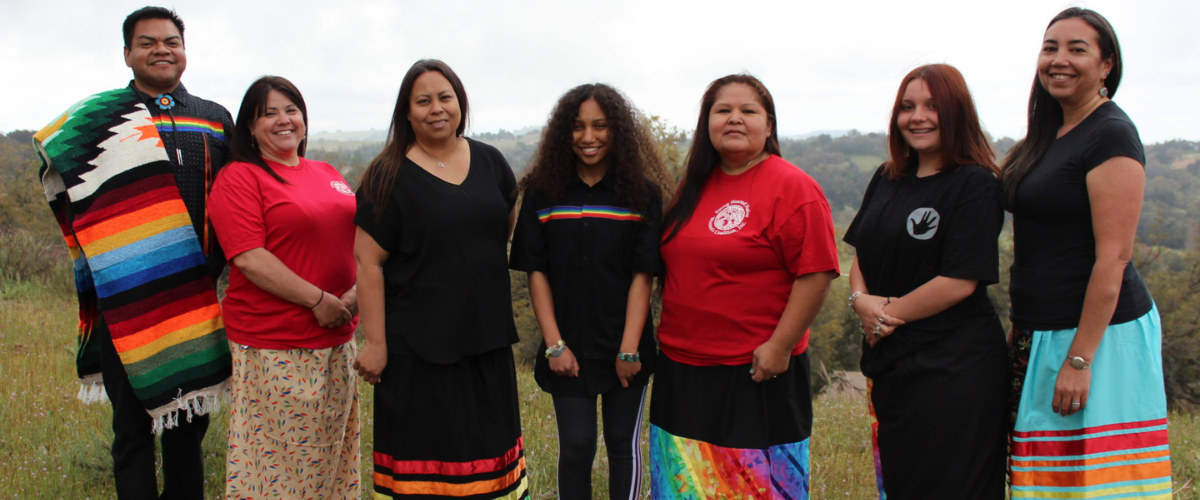
“Two-spirit” refers to a person who identifies as having both a masculine and a feminine spirit, and is used by some Indigenous people to describe their sexual, gender and/or spiritual identity. As an umbrella term it may encompass same-sex attraction and a wide variety of gender variance, including people who might be described in Western culture as gay, lesbian, bisexual, transsexual, transgender, gender queer, cross-dressers or who have multiple gender identities. Two-spirit can also include relationships that could be considered poly. The creation of the term “two-spirit” is attributed to Elder Myra Laramee, who proposed its use during the Third Annual Inter-tribal Native American, First Nations, Gay and Lesbian American Conference, held in Winnipeg in 1990. The term is a translation of the Anishinaabemowin term niizh manidoowag, two spirits. (Statistics provided by: LGBTQ2S+ Health)
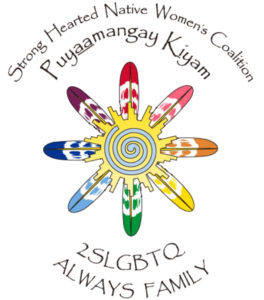
"Our place in the circle is just as important as any other in our community. This includes safety and protections for us all"
-Asoonax Harolds
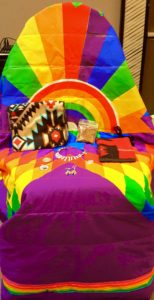
two spirit history
Adopted in 1990 in Winnipeg, Canada. In place of the French word(berdache). Two spitit describes the Identity of traditional roles in certain tribes. The sexually uninhibited beliefs of American Indians were shamed and deemed barbaric and at god’s mercy if they did not stop immediately.
Even with the modern adoption of pan-Indian terms like two spirit, not all cultures will perceive two spirit people the same way, or welcome a pan-Indian term to replace the terms already in use by their cultures.
Two spirit roles, in particular, were singled out for condemnation, interference, and many times violence. As a result, two spirit traditions and practices went underground or disappeared in many tribes.
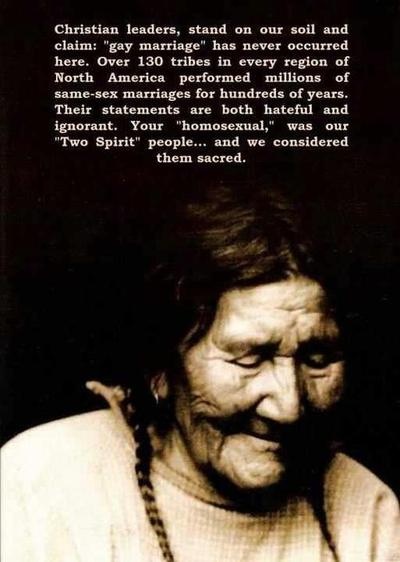
two spirit traditions
Two-spirit individuals were experts in traditional arts - such as pottery making, basket weaving, and the manufacture and decoration of items made from leather. Among the Navajo, two-spirit males often became weavers, usually women and men's work, as well as healers, which was a male role. By combining these activities, they were often among the wealthier members of the tribe. Two-spirit females engaged in activities such as hunting and warfare, and became leaders in war and even chiefs.
"This is the first gallery exhibition that highlights the role of Two Spirit people in traditional Native American society and includes the extremely rare work of the two best known 19th Century two spirit artists, We’wha and Arroh-ah-och, along with contemporary Two Spirit artists.
Prominent in this exhibition are a Zuni ceramic bowl circa 1880 attributed to We’wha (1849 - 1896) the well-documented Two Spirit artist and a Laguna ceramic attributed to Arroh-ah-och, a Two Spirit ceramicist in Laguna also active at the end of the 19th century" (We'wha and the Two Spirit Tradition, Then and Now)
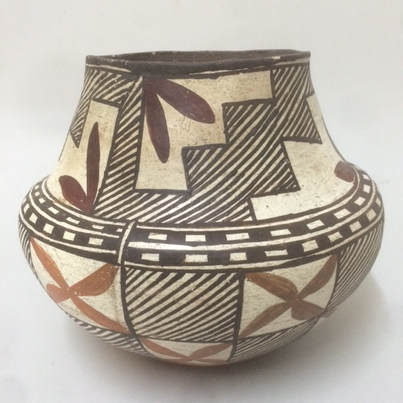
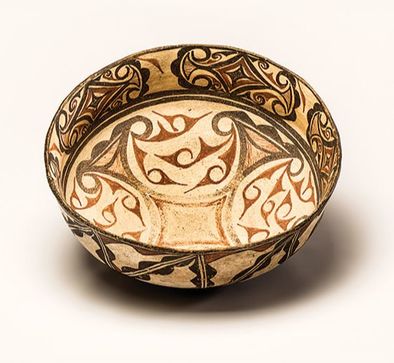
STATISTICS
In a state survey, nearly 1 in 3 LGBTQ and Two-Spirit AI/ANs (29.4%) reported experiencing hate violence—a higher rate than any other LGBTQ community

- Nationwide, approximately 40% of gay men and half of bisexual men have experienced sexual violence, compared to 20% of heterosexual men
- 75% of bisexual women and 44% of lesbians have experienced rape, physical violence, or stalking by an intimate partner, compared to 35% of heterosexual women
- 47% of our transgender siblings and 55% of all non-binary people experience sexual assault in their lifetimes
- Two-Spirit elders who have experienced discrimination report poorer health and increased physical pain and impairment
- Two-Spirit identifying women face multifaceted challenges including stigma regarding their sexual orientation, exclusion from mainstream Two-Spirit discourse, and sexism from both AI/AN and LGBTQ communities (Statistics provided by:
National Resource Center on LGBTQ+ Aging)
RESOURCES
The Avellaka Program: Rainbow of Truth Circle
Call 760-742-8628
Located at 22000 HWY 76, Pauma Valley, CA 92061
North County LGBTQ Resource Center
Call 760-994-1690
Located at 3220 Mission Ave, Suite #2, Oceanside, CA 92058
Visit www.ncresourcecenter.org
San Diego LGBT Community Center
Call 619-692-2077
Located at 3909 Centre St, San Diego, CA 92103
Visit www.thecentersd.org
San Diego LGBT Pride
Call 619-297-7683
Located at 3620 30th St, San Diego, CA 92104
Visit http://www.sdpride.org
Hillcrest Youth Center
Call 619-497-2920 Ext.250
Located at 1807 Robinson Ave, Ste 106, San Diego, CA 92103
Contact hyc@thecentersd.org
PFLAG San Diego Chapter
Call 888-398-0006
Visit www.pflag.com
PFLAG Temecula Valley: Parents, Families and Friends of Lesbian and Gays
Call 951-878-8052
Located at 41000 Main St, Temecula CA 92591
San Diego Equality Business Association
Call 619-296-4543
Visit www.sdeba.org
LGBT Community Center of Coachella Valley
Call 760-416-7790
Located at 1301 N Palm Canyon Dr, Ste 301, Palm Springs, CA 92262
Visit www.thecenterps.org
GLSEN San Diego Chapter Supporting Students and Teachers
Call 212-727-0135
Located at GLSEN 110 William St. 30th Fl, New York 10038
Visit https://www.glsen.org/chapter/san-diego-county
Human Rights Campaign San Diego
Visit www.hrc.org
LGBTQ+ Center of Riverside County
Call 951-364-3305
Temecula Valley Pride
Call 951-290-0491
Visit www.temeculavalleypride.org
The Trevor Project
Call the 24/7 Hotline 866-488-7386
Visit www.trevorproject.org
It Gets Better Project
Visit www.itgetsbetterproject.org
University of Redlands Pride Center: Office of Diversity and Inclusion
Call 909-748-8287
Located at 1200 E. Colton Ave, Redlands, CA 92521
UC Riverside LGBT Resource Center
Call 951-827-2267
Located at 245 Costo Hall Riverside, CA 92521
CSU San Bernardino Pride Center
Located at Santos Manuel Student Union, San Bernardino, CA 92407
Cal Poly Pomona Pride Center
Call 909-869-2573
Located at 3801 W. Temple Ave, BLDG 26, Rm 107, Pomona CA 91768
Imperial Valley LGBT Resource Center
Call 760-592-4066
Located at 1073 Ross Ave Set E, El Centro CA 92243
Contact info@ivlgbtcenter.com
